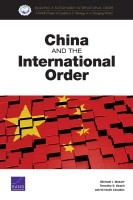| 来源类型 | Research Reports
|
| 规范类型 | 报告
|
| DOI | https://doi.org/10.7249/RR2423
|
| ISBN | 9781977400628
|
| 来源ID | RR-2423-OSD
|
| China and the International Order |
| Michael J. Mazarr; Timothy R. Heath; Astrid Stuth Cevallos
|
| 发表日期 | 2018
|
| 出版年 | 2018
|
| 页码 | 172
|
| 语种 | 英语
|
| 结论 |
China's Support of the Order- China's behavior over the past two decades does not mark it as an opponent or saboteur of the postwar international order, but rather as a conditional supporter.
- China can be expected to demand more influence in the international system as a condition for its support.
Looking Forward- The posture China takes toward the institutions, norms, and rules of a shared order is in significant flux; a range of outcomes — from continued qualified support to more-aggressive challenges — are possible.
- Events, both inside and outside China, could drive its policy in many directions, and its future strategy is probably more unclear than at any time in years. U.S. policy must take into account this fundamental uncertainty.
Strengthening the Order- A strengthened and increasingly multilateral international order can continue to provide a critical tool for the United States and other countries to shape and constrain rising Chinese power.
- Examples of reforms to build multilateralism and strengthen norms include measures to expand the role of China and other developing economies in the International Monetary Fund and to increase Chinese involvement in mediating international conflicts through the United Nations.
China's Rising Power- Modifications to the order on the margins in response to Chinese preferences will typically pose less of a threat to a stable international system than a future in which China is alienated from that system.
- Although Chinese-led initiatives do challenge U.S. leadership and influence, they generally do not pose a threat to the fundamental integrity of the international system.
|
| 摘要 |
- The United States should develop a comprehensive strategy to sustain and expand China's role in the international order.
- The growth of Chinese power is not something the United States can or should oppose per se, but rather seek to steer in a direction that reinforces existing institutions and norms.
- Rising Chinese power and self-confidence will produce an era of rising Sino-American tension and rivalry. The challenge is to manage the emerging rivalry in ways that avoid major conflict, leave open the potential for cooperation on as many issues of mutual concern as possible, and safeguard vital U.S. interests.
- The United States should continue to dissuade China from employing various forms of violent aggression to fulfill its regional ambitions.
- Regional states are not naive about the possible forms of Chinese muscle-flexing and continue to look to the United States to play an essential role in deterrence.
- U.S. strategy should also ensure military readiness to exercise credible deterrence against aggressive challenges to the international order. In select cases involving core values regarding human rights and democracy, the United States should reaffirm its commitment to norms that reflect those values and resist Chinese efforts to change them — but in a measured way that builds on common values and concerns.
|
| 主题 | China
; Globalization
; International Diplomacy
; International Trade
; United States
|
| URL | https://www.rand.org/pubs/research_reports/RR2423.html
|
| 来源智库 | RAND Corporation (United States)
|
| 引用统计 |
|
| 资源类型 | 智库出版物
|
| 条目标识符 | http://119.78.100.153/handle/2XGU8XDN/108771
|
推荐引用方式
GB/T 7714 |
Michael J. Mazarr,Timothy R. Heath,Astrid Stuth Cevallos. China and the International Order. 2018.
|
|
文件名:
|
x1526908508444.jpg
|
|
格式:
|
JPEG
|

|
文件名:
|
RAND_RR2423.pdf
|
|
格式:
|
Adobe PDF
|
除非特别说明,本系统中所有内容都受版权保护,并保留所有权利。